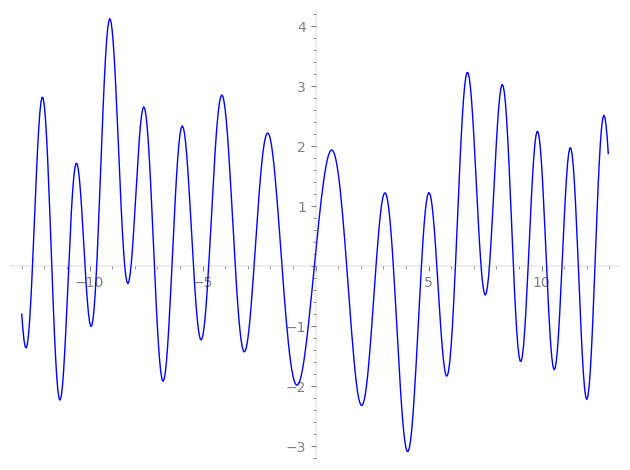| L(s) = 1 | + (−0.298 − 0.298i)7-s − 11.4·11-s + (1.59 − 1.59i)13-s + (10.4 + 10.4i)17-s + 2.80i·19-s + (19.1 − 19.1i)23-s − 5.61i·29-s − 15.4·31-s + (40.6 + 40.6i)37-s − 70.6·41-s + (−20.2 + 20.2i)43-s + (−42.5 − 42.5i)47-s − 48.8i·49-s + (−3 + 3i)53-s − 66.8i·59-s + ⋯ |
| L(s) = 1 | + (−0.0426 − 0.0426i)7-s − 1.03·11-s + (0.122 − 0.122i)13-s + (0.611 + 0.611i)17-s + 0.147i·19-s + (0.830 − 0.830i)23-s − 0.193i·29-s − 0.496·31-s + (1.09 + 1.09i)37-s − 1.72·41-s + (−0.472 + 0.472i)43-s + (−0.904 − 0.904i)47-s − 0.996i·49-s + (−0.0566 + 0.0566i)53-s − 1.13i·59-s + ⋯ |
\[\begin{aligned}\Lambda(s)=\mathstrut & 1800 ^{s/2} \, \Gamma_{\C}(s) \, L(s)\cr =\mathstrut & (-0.973 + 0.229i)\, \overline{\Lambda}(3-s) \end{aligned}\]
\[\begin{aligned}\Lambda(s)=\mathstrut & 1800 ^{s/2} \, \Gamma_{\C}(s+1) \, L(s)\cr =\mathstrut & (-0.973 + 0.229i)\, \overline{\Lambda}(1-s) \end{aligned}\]
Particular Values
| \(L(\frac{3}{2})\) |
\(\approx\) |
\(0.2089050879\) |
| \(L(\frac12)\) |
\(\approx\) |
\(0.2089050879\) |
| \(L(2)\) |
|
not available |
| \(L(1)\) |
|
not available |
\(L(s) = \displaystyle \prod_{p} F_p(p^{-s})^{-1} \)
| $p$ | $F_p(T)$ |
|---|
| bad | 2 | \( 1 \) |
| 3 | \( 1 \) |
| 5 | \( 1 \) |
| good | 7 | \( 1 + (0.298 + 0.298i)T + 49iT^{2} \) |
| 11 | \( 1 + 11.4T + 121T^{2} \) |
| 13 | \( 1 + (-1.59 + 1.59i)T - 169iT^{2} \) |
| 17 | \( 1 + (-10.4 - 10.4i)T + 289iT^{2} \) |
| 19 | \( 1 - 2.80iT - 361T^{2} \) |
| 23 | \( 1 + (-19.1 + 19.1i)T - 529iT^{2} \) |
| 29 | \( 1 + 5.61iT - 841T^{2} \) |
| 31 | \( 1 + 15.4T + 961T^{2} \) |
| 37 | \( 1 + (-40.6 - 40.6i)T + 1.36e3iT^{2} \) |
| 41 | \( 1 + 70.6T + 1.68e3T^{2} \) |
| 43 | \( 1 + (20.2 - 20.2i)T - 1.84e3iT^{2} \) |
| 47 | \( 1 + (42.5 + 42.5i)T + 2.20e3iT^{2} \) |
| 53 | \( 1 + (3 - 3i)T - 2.80e3iT^{2} \) |
| 59 | \( 1 + 66.8iT - 3.48e3T^{2} \) |
| 61 | \( 1 + 44.5T + 3.72e3T^{2} \) |
| 67 | \( 1 + (28.2 + 28.2i)T + 4.48e3iT^{2} \) |
| 71 | \( 1 + 32.5T + 5.04e3T^{2} \) |
| 73 | \( 1 + (62.6 - 62.6i)T - 5.32e3iT^{2} \) |
| 79 | \( 1 - 118. iT - 6.24e3T^{2} \) |
| 83 | \( 1 + (11.2 - 11.2i)T - 6.88e3iT^{2} \) |
| 89 | \( 1 - 11.2iT - 7.92e3T^{2} \) |
| 97 | \( 1 + (49 + 49i)T + 9.40e3iT^{2} \) |
| show more | |
| show less | |
\(L(s) = \displaystyle\prod_p \ \prod_{j=1}^{2} (1 - \alpha_{j,p}\, p^{-s})^{-1}\)
Imaginary part of the first few zeros on the critical line
−8.442304821193598823590371186850, −8.164581204692672901829270602696, −7.12902477756198360911336085545, −6.35447320627881713953004001770, −5.40068031861376572940143466461, −4.72862588607603887959526015222, −3.55243480390687330185677138275, −2.72192175529928343792554215686, −1.48455050810587335893577785462, −0.05424790399642572758179719974,
1.37822461525569018074771707318, 2.67354321871273166357406565722, 3.44189286373947109683212035060, 4.68164796391330076772356699048, 5.36569402101479854844374968587, 6.18743582859492781931150503333, 7.32266558292740569696132102621, 7.69181382778084544900462351575, 8.752948461438179427575914693156, 9.405305148389946954454979641424

